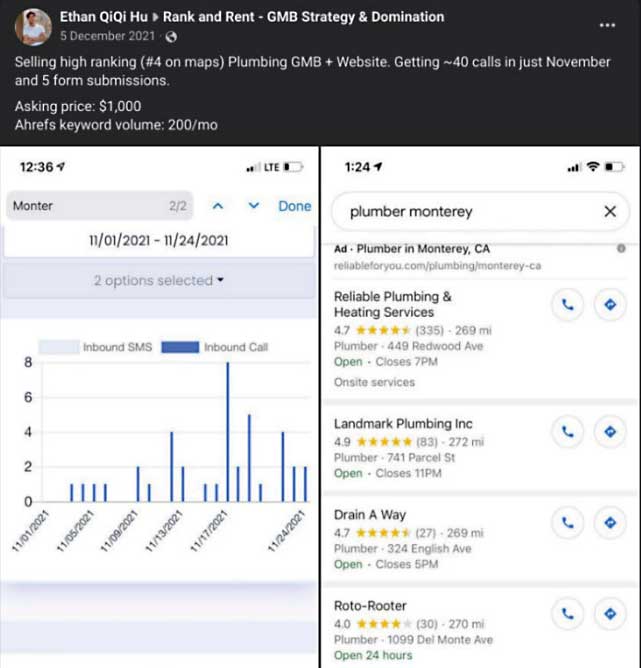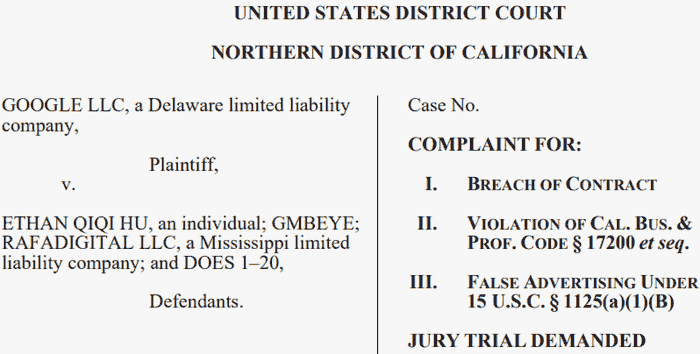Google is suing an online marketer for violating its terms of service and jeopardizing Google SEO ranking, aiming to prevent the defendant from causing additional harm to Google as well as to business owners and consumers.
The defendant being sued was a member of a public Facebook group called Rank and Rent – GMB Strategy & Domination.
According to the legal complaint, the company in question has been found guilty of deceptive practices, engaging in activities that contravene both federal and state laws, and breaching their contractual obligations with Google, as explicitly outlined in the terms of service agreement.
There are three main schemes the defendants are accused of:
“(1) fraudulent verification of nonexistent Business Profiles,
(2) posting fake reviews on Business Profiles, and
(3) selling real businesses leads from unsuspecting customers who seek services from the businesses listed on Defendants’ fake Business Profiles.”
The two entities being sued are GMBEye and Rafadigital, which Google links together as one company.
Rank and Rent
Rank and rent refers to a strategy where individuals create a website and a corresponding business profile with the intention of selling leads generated from it, renting it to a business at a fixed price, or selling the entire business profile and website as a package.
This approach gained significant attention starting in 2019.
Surprisingly, the practitioners of rank and rent demonstrate a notable lack of wisdom, experience, or judgment by openly operating a public Facebook page. On this page, they openly discuss their strategies and advertise the sale of their websites and business profiles.
Google’s legal action involves a captured image of a public Facebook group, where the accused individual is described as engaging in the activity of “renting out GMBs” and “selling GMBs.”
The defendant was a member of a Facebook group focused on rank and rent strategies, where he openly declared his involvement in leasing and selling Google Business Profiles. This aligns with the practices typically associated with rank and rent techniques.
Screenshot of Rank and Rent Facebook Group Published in Google Lawsuit

The lawsuit describes the business practice:
“Once Defendants successfully verify these dummy Business Profiles, they proceed to either sell the listing or modify the fake business’s information to make the Business Profile more desirable to potential buyers.
At times, Defendants transfer control of fraudulently-verified Business Profiles, updated to include an unverified real-world business’s business information, to their buyers.”
Google Business Profile Verification Service
One of the services that the company provided was Google Business Profile verification services, as well as promising top listings.
According to Google:
“GMBEye is replete with express and implied assurances that Defendants are able to bypass the verification procedures that Google requires of most merchants, and also to ensure a particular business listing is ‘at the top’ of Google Search results—a misleading and false statement, for no business or entity can guarantee such placement by Google’s Search algorithm.
Much of Defendants’ messaging suggests that GMBEye has preferential access to Google or is otherwise uniquely positioned with respect to Google, allowing it to secure the ‘Premium Business Listing Verification’ that is unavailable to those who verify their businesses through Google’s free processes.
…GMBEye’s customers and prospective customers likely include both legitimate merchants seeking a shortcut through Google’s procedures, as well as other scammers or bad actors who abuse fake business listings; while the latter may quickly recognize GMBEye as a fellow scammer, the former may not.”
The legal complaint raises concerns about the statements presented on the website, indicating that the company asserts to possess an exclusive approach for gaining trust from Google, enabling them to accelerate the process. Additionally, the lawsuit highlights the defendant’s use of extraordinary claims.
According to the lawsuit:
“Further explanation on the GMBEye website boasts that Defendants can even verify businesses ‘with [s]pammy names,’ suggesting the service avoids Google’s measures to maintain accurate and high-quality Business Profiles.
Defendants similarly claim that “[m]ost verification methods cant [sic] handle that because Google will suspend your listing but with our method you can sustainability rank your GMBs with Spammy names helping you rank on Google in no time!”
GMB Profiles and Fake Reviews
The legal case asserts that the accused party promises enhancements for Google Maps and “GMB” profile listings while actively promoting positive reviews.
Additionally, the lawsuit points out that the business asserts its capability to achieve the top ranking for customers—an action considered suspicious in the search marketing field, as it is widely acknowledged that guaranteeing such results is impossible.
Lead Generation
The lawsuit alleges that the defendants promoted their services by claiming expertise in lead generation, which involves generating sales calls and contacts as well as sales leads for businesses. This practice is commonly referred to as Rank and Rent.
The lawsuit states:
“Rafadigital claims that it can “[g]et high converting leads direct to your phone” “for all industries[.]””
Google Describes Rank and Rent Scheme
The lawsuit offers a description of how the defendants operated their scheme.
They write:
“…Defendants first create a Business Profile for a fake business, generally accompanied by a fake website based on a simple template.
Defendants typically associate these fake businesses with Voice over Internet Protocol (“VoIP”) phone numbers whose area codes correspond to the fake businesses’ supposed locations.
Upon information and belief, Defendants have been associated with over 350 fake Business Profiles listings since mid-2021.”
How Defendants Tricked the Google Verification System
The ease with which Google’s verification system could be bypassed was quite surprising.
The accused party seemed to have put minimal effort into generating authentic photos and videos to establish their legitimacy as a genuine business. In some instances, they even used the same toolbench, captured from various angles, in an attempt to validate their existence as a business.
One piece of evidence presented in the legal case is a video screenshot displaying an individual who Google claims is linked to a fictitious chiropractor named Wilmington Chiro Health.
This particular evidence was utilized during the verification procedure for the non-existent chiropractor.

The legal case also includes photographs submitted by the accused while confirming the authenticity of a business named “Western Los Angeles Garage Door Repair.”
The defendant deliberately shared this particular image with the intention of deceiving Google into perceiving it as a representation of the actual workspace.

The provided image submitted to Google for verification of a Houston, Texas-based company called “Pro Tree Service” displays an identical tool bench:

In Google’s legal case, they presented an additional piece of evidence that the defendants utilized to authenticate the legitimacy of a fictitious business listing titled “AS Budget Plumbers,” claiming to operate from Davis, California. The defendants reached out to Google on March 29, 2022, to verify this fraudulent listing.
Rank and Rent – GMB Strategy & Domination Facebook Group
Google has filed a legal complaint against a Facebook group called Rank and Rent – GMB Strategy & Domination, accusing its members of engaging in the sale of business listings.
The lawsuit describes the process:
“For example, Mr. Hu posted the below offer to sell a Business Listing in a Facebook group called “Rank and Rent – GMB Strategy & Domination,” claiming that his listing for a “Plumbing GMB + Website” in Monterey, California, had received “~40 calls and 5 form submissions” in the prior month—presumably from residents of the Monterey area who were seeking assistance with a plumbing issue.”

According to the lawsuit:
“Mr. Hu—who admits in his biography on GMBEye.com to “renting out GMBs” and “selling GMBs”—sought $1,000 for this nonexistent business’s Business Profile.”
Fake Google Profile Reviews
The individual in question is additionally charged with the sale of counterfeit reviews. According to Google, these reviews were allegedly sourced from fraudulent review providers located in Bangladesh and Vietnam.
According to the lawsuit
“To further bolster their fake listings’ illusions of legitimacy and credibility, and as an added service to their buyers, Defendants cause fake reviews to be posted to their fraudulent Business Profiles and those transferred to their clients.
…Upon information and belief, Defendants are connected to a network of over 350 fraudulent Business Profiles that involve at least 14,000 fake reviews.
Nearly all of the reviews awarded five out of a potential five stars.
And a majority of these reviews—including the at least 14,000 reviews noted above—were posted by two actors located in Bangladesh and Vietnam, an ocean away from the many purported U.S. businesses for which these accounts posted reviews.”
Damages Sought By Google
Google has filed a lawsuit against the individuals involved in the rank and rent scheme, seeking damages worth three times the actual losses incurred, along with compensation for attorney fees and prejudgment interest.
According to a webpage from Cornell University Law School, prejudgment interest can be defined as follows:
“The interest that a creditor, usually a plaintiff in the case, is entitled to collect, derived from the amount of a judgment, which compensates the creditor for an injury which occurred before the judgment.
… Another example is Short v. U.S., where the Federal Circuit awarded the Yurok Indians prejudgment interest on their damages to recover revenue generated from timber harvesting from which they were wrongly excluded.”
Google’s Terms of Service

There are individuals who show a lack of concern when it comes to disregarding Google’s terms of service, disregarding their importance and viewing Google as separate from legal authority.
Google has filed a lawsuit against the accused party for breaking the contract by violating the terms of service concerning Google Maps and Google Business Profiles.
This legal action emphasizes the significance of not treating Google’s terms of service casually.
The lawsuit serves as evidence that Google possesses the authority to legally enforce their terms of service.
Read the text of Google’s lawsuit (PDF)
For more such tips, updates and learning resources, stay tuned to Insitebuild Blog.






